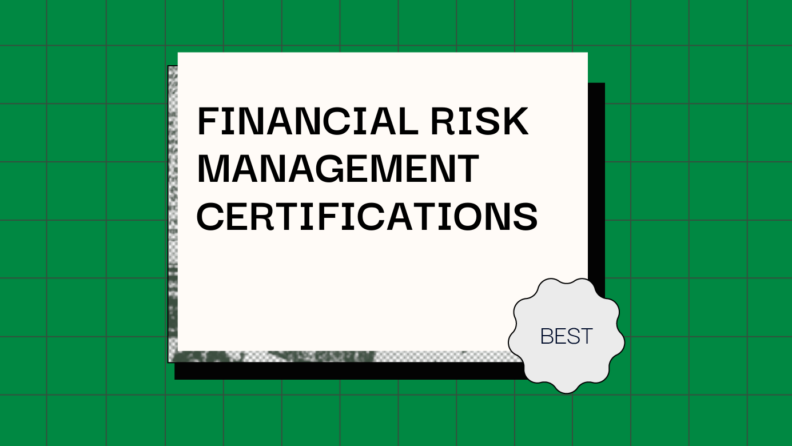Managing financial risk without up-to-date knowledge is a challenge for any organization. As a CFO, outdated practices and incomplete insights can expose your company to unnecessary risks in areas like compliance, cash flow forecasting, and market volatility.
Throughout my career as a financial controller, I’ve refined risk management strategies and learned the value of staying ahead of trends. To support your journey, I’ve reviewed top certifications and courses in financial risk management, selecting those with real-world value and practical insights.
As such, I'm confident that these programs will equip you with the skills to successfully manage risks and strengthen your organization’s financial stability. Let's get into it.
Best Financial Risk Management Certifications Shortlist
- Financial Risk Manager (FRM) — Best for globally recognized risk management
- Professional Risk Manager (PRM) — Best for comprehensive risk management skills
- RIMS-Certified Risk Management Professional (RIMS-CRMP) — Best for strategic risk management proficiency
- Certified in Risk and Information Systems Control (CRISC) — Best for IT risk management and control
- Operational Risk Management (ORM) Certificate — Best for operational risk insights
- Market, Liquidity and Asset Liability Risk Management (MLARM) Certificate — Best for understanding financial risk dynamics
- Certified Risk and Compliance Management Professional (CRCMP) — Best for compliance and risk management integration
- Certification in Risk Management Assurance (CRMA) — Best for risk management assurance proficiency
- Certified Financial Risk Professional (CFRP) — Best for financial risk expertise
- International Certificate in Financial Services Risk Management — Best for financial services risk specialization
- Certificate in Financial and Credit Risk Management — Best for credit and financial risk management
- Certified Financial Risk Management Professional (CFRMP) — Best for business-focused financial risk management
Overview of the Best Financial Risk Management Certifications
Below are my detailed summaries of the best financial risk management certifications that made it onto my shortlist.
1. Financial Risk Manager (FRM) — Best for globally recognized risk management
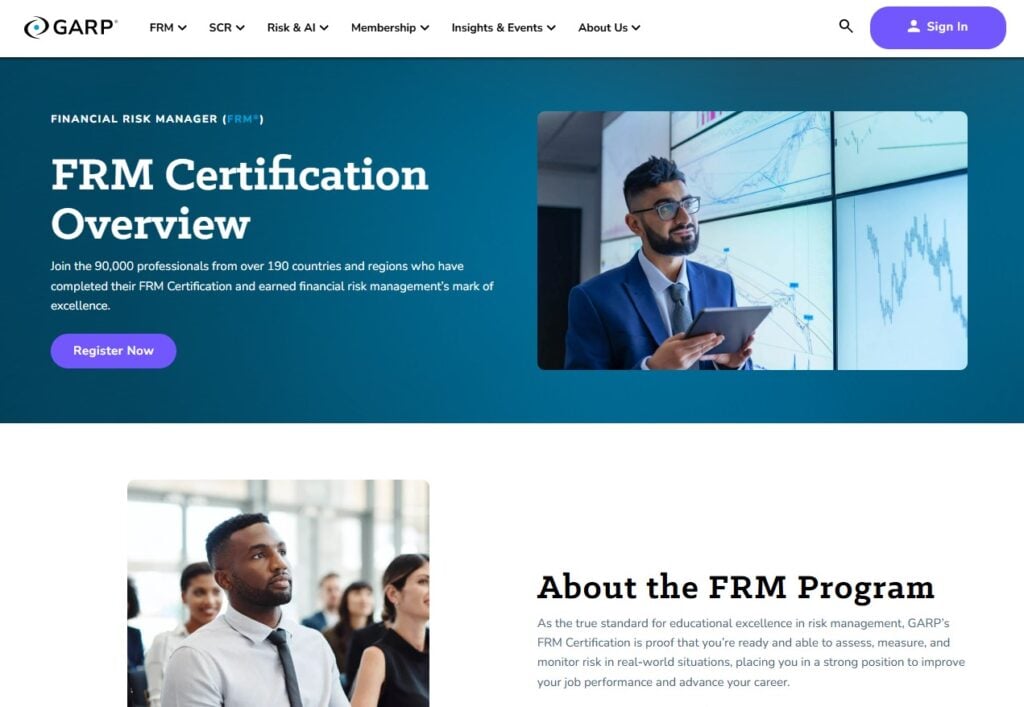
The Financial Risk Manager (FRM) certification, offered by the Global Association of Risk Professionals (GARP), is a prestigious designation in financial risk management. It validates a professional's ability to understand and address the complexities of modern risk management practices.
Issued by: Global Association of Risk Professionals (GARP)
Focus:
- Market risk
- Credit risk
- Operational risk
- Risk management tools and strategies
Prerequisites:
- Education: Not required, but a strong foundation in finance and risk management is beneficial
- Work Experience: Two years of relevant work experience within five years of the FRM Exam Part II is required
- Exam: Passing the FRM Exam Part I and Part II
- Other Certifications Required: None
Renewability: No, it does not expire; however, certified FRMs are encouraged to participate and earn 40 credits of CPD every two years.
Price:
- FRM Enrollment Fee: $400
- Exam Part I (Early Registration): $600
- Exam Part II (Early Registration): $600
Who It’s For: Chief audit executives, internal audit managers, and auditors
2. Professional Risk Manager (PRM) — Best for comprehensive risk management skills
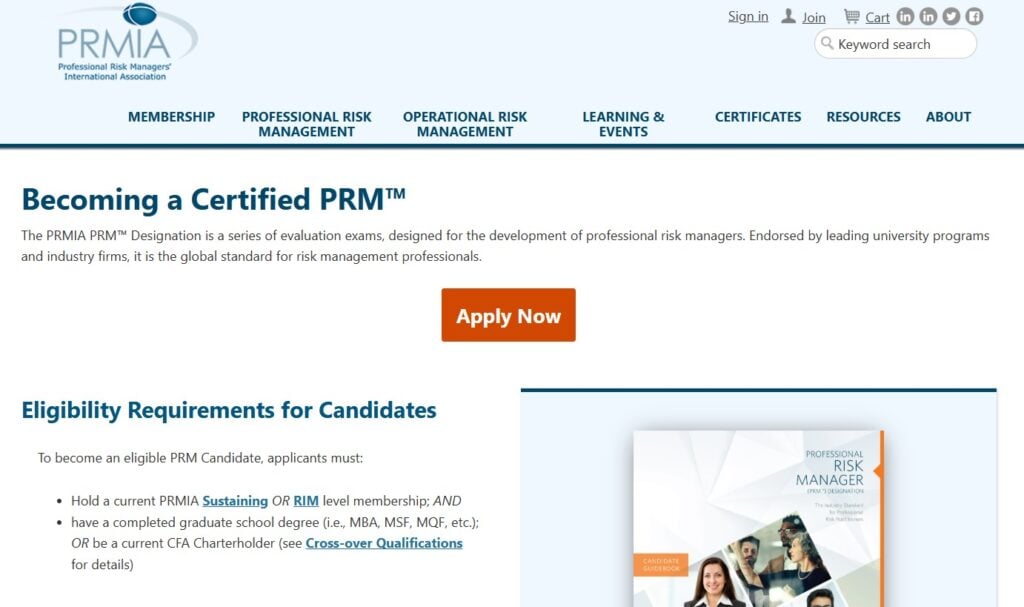
The PRMIA Pofessional Risk Manager (PRM) certification is a globally recognized standard for professional risk managers, endorsed by top universities and industry leaders. It evaluates a candidate's knowledge and skills through a rigorous series of assessments focused on risk management practices. Candidates must meet strict eligibility and performance criteria to earn this prestigious designation.
Issued by: PRMIA
Focus:
- Risk management theories and practices
- Financial markets and products
- Risk measurement
- Risk management frameworks
Prerequisites:
- Education:
- Graduate degree (e.g., MBA, MSF, MQF) OR;
- Bachelor's degree with 2 years of full-time work experience
- Work Experience: 4 years of full-time work experience if no graduate degree
- Exam: Passing the PRM exams within two years with a minimum 60% score on each
- Other Certifications Required:
- CFA charterholder
- Current PRMIA sustaining or RIM level membership
Renewability: Yes, every year
Price: Starts at $175
Who It’s For: Risk managers, financial analysts, investment bankers, corporate finance professionals, and Chief Financial Officers (CFOs)
3. RIMS-Certified Risk Management Professional (RIMS-CRMP) — Best for strategic risk management proficiency
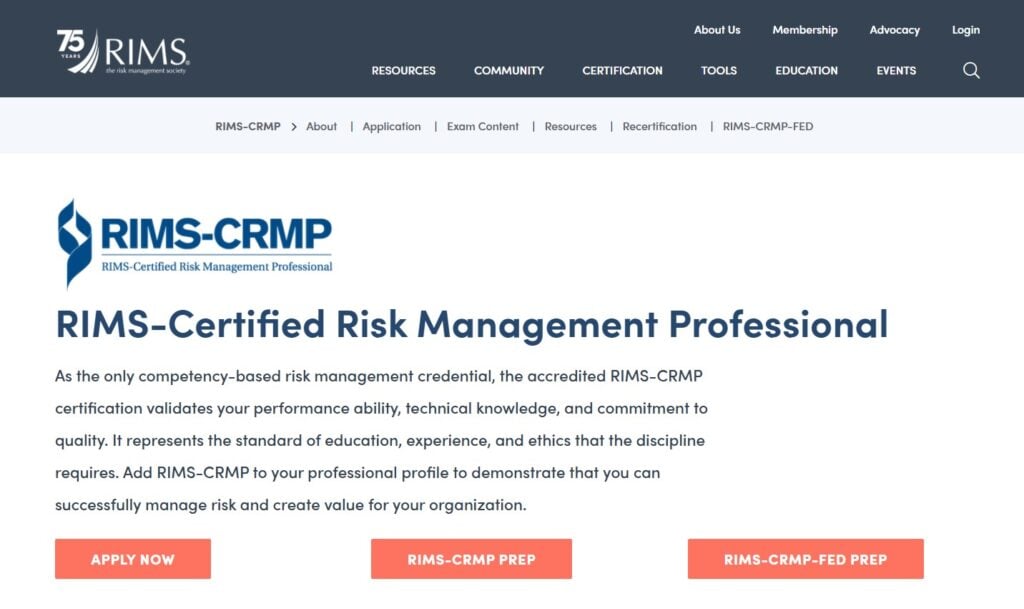
The RIMS-CRMP is the only accredited financial risk management certification for risk management professionals, emphasizing competency and performance. It demonstrates expertise in managing risk and delivering value while adhering to high ethical standards. Achieving this certification sets a benchmark for education, experience, and professionalism in the field.
Issued by: RIMS
Focus:
- Core risk management competencies
- Frameworks and processes
- Techniques for financial, operational, and risk management
Prerequisites:
- Education:
- Bachelor’s degree (or equivalent) in risk management
- Currently acting as a final-year student in a bachelor’s or higher degree program in risk management
- Bachelor’s degree (or equivalent) in a non-risk management field
- Work Experience:
- 1 year of full-time experience in risk management (with a degree in risk management)
- 3 years of full-time experience in risk management (with a degree in a non-risk management field)
- 6 years of risk management experience (without a degree)
- Exam: Passing the RIMS-CRMP exam with a score of 71% or higher
- Other Certifications Required: None
Renewability: Yes, every two years
- Risk Professionals:
- RIMS Members: $375
- Non-Members: $525
- Students:
- RIMS Members: $275
- Non-Members: $375
Who It’s For: Risk managers, financial analysts, and Chief Financial Officers (CFOs)
4. Certified in Risk and Information Systems Control (CRISC) — Best for IT risk management and control
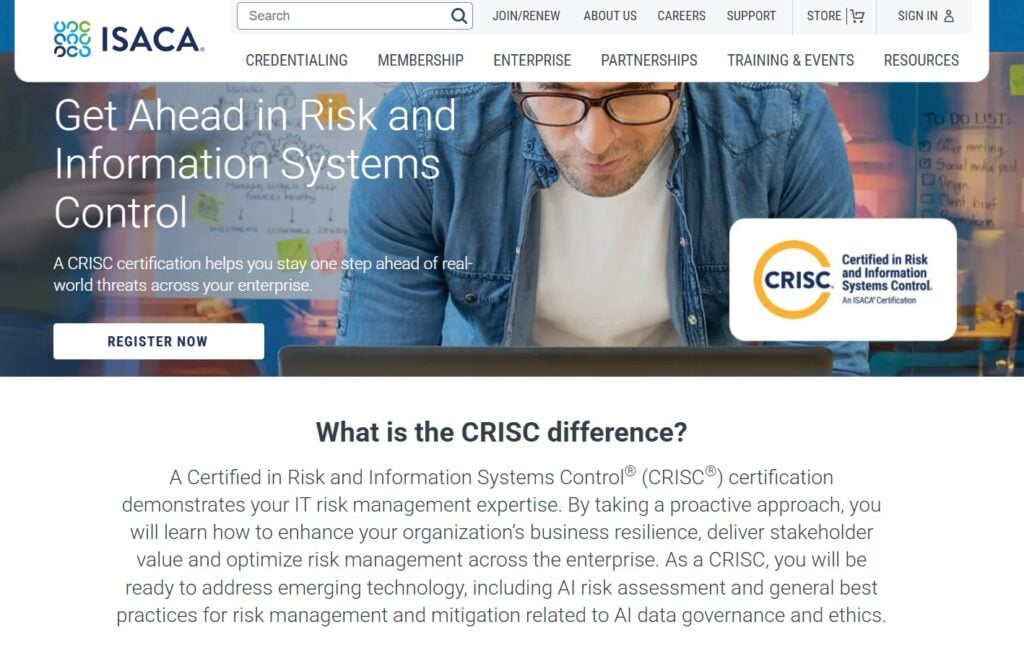
The CRISC certification validates expertise in IT risk management and control, focusing on building organizational resilience. It demonstrates proficiency in identifying, assessing, and mitigating technology-related risks to drive stakeholder value. Achieving this certification signifies advanced skills in managing and optimizing enterprise risk management processes.
Issued by: ISACA
Focus:
- Corporate IT governance
- IT risk assessment
- Risk response and reporting
- Information technology and security
Prerequisites:
- Education: Not required
- Work Experience: Minimum of 3 years of CRISC experience across 2 of 4 domains, including Domain 1 or 2
- Exam: Passing the CRISC exam
- Other Certifications Required: None
Renewability: Yes, it requires a minimum of 20 CPEs annually and 120 every three years.
Price:
- Members: $575
- Non-Members: $760
Who It’s For: IT risk managers, information security professionals, cybersecurity analysts, IT auditors, compliance officers, Chief Information Security Officers (CISOs), Chief Information Officers (CIOs), and risk management professionals
5. Operational Risk Management (ORM) Certificate — Best for operational risk insights
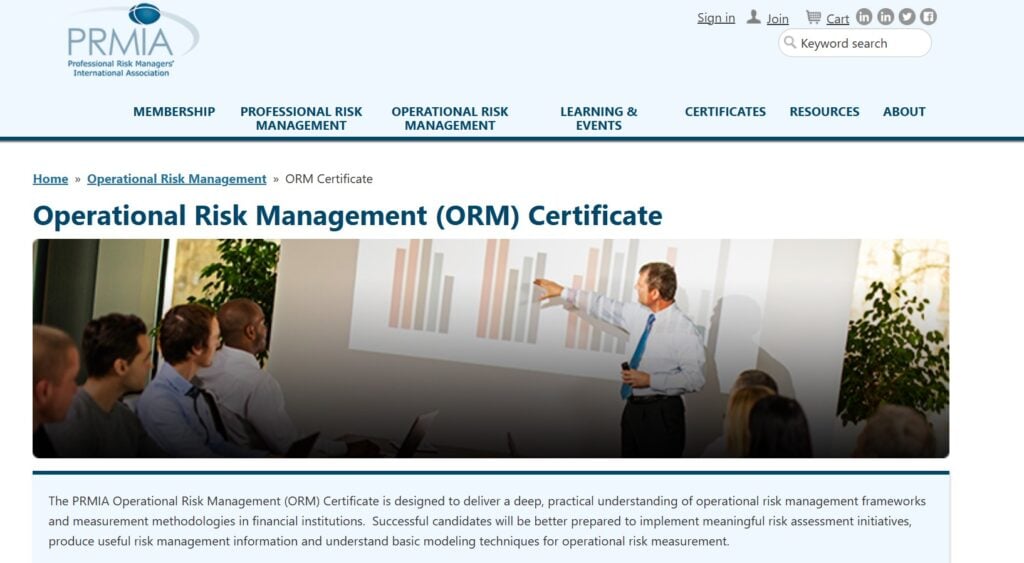
The PRMIA Operational Risk Management Certificate provides a strong foundation for understanding and addressing operational risks within organizations. It highlights the importance of creating meaningful strategies to manage and measure risk effectively.
Issued by: PRMIA
Focus:
- Operational risk management frameworks
- Risk assessment initiatives
- Operational risk measurement techniques
- Operational resilience
- Risk governance
- Climate risk
Prerequisites:
- Education: Not required
- Work Experience: Not required
- Exam: Passing the ORM exam
- Other Certifications Required: None
Renewability: No, it does not expire
Price:
- Sustaining Members: $499
- Contributing Members: $520
- Non-Members: $549
Who It’s For: Risk managers, internal auditors, compliance officers, and operational risk analysts
6. Market, Liquidity and Asset Liability Risk Management (MLARM) Certificate — Best for understanding financial risk dynamics
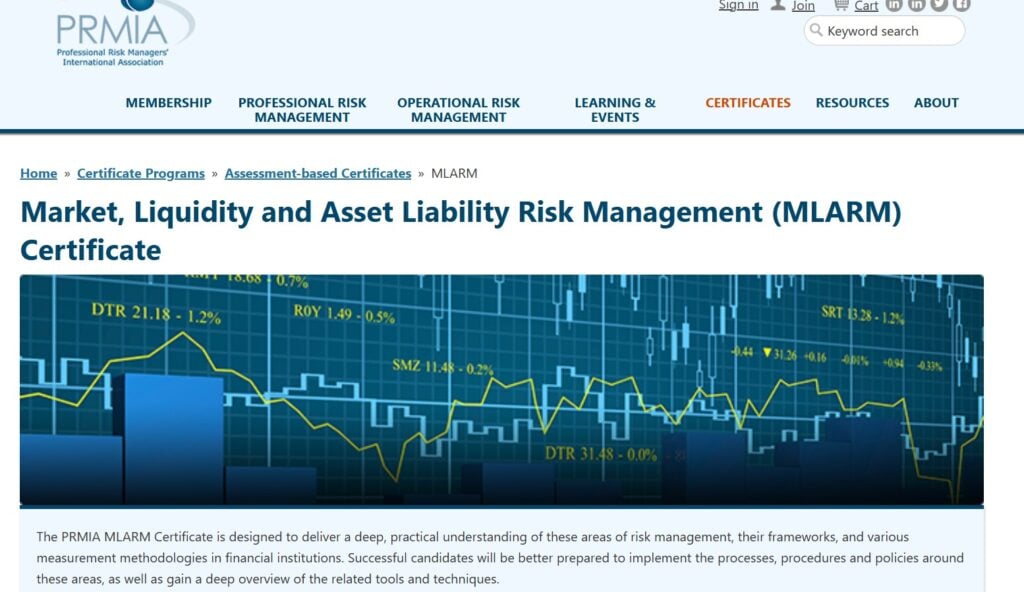
The PRMIA MLARM certificate offers an advanced understanding of financial risk management frameworks and methodologies. It includes case studies, education programs, and modules focused on aligning key risk areas, developing risk models, and supporting professional development to enhance decision-making and resilience in financial institutions.
Issued by: PRMIA
Focus:
- Market risk governance
- Risk measurement methodologies
- Stress testing
- Balance sheet management
- Fundamental Review of the Trading Book (FRTB)
- ESG considerations
Prerequisites:
- Education: Not required
- Work Experience: Not required
- Exam: Passing the MLARM exam with a 60% score or higher
- Other Certifications Required: None
Renewability: No, it does not expire
Price:
- Sustaining Members: $499
- Contributing Members: $520
- Non-Members: $549
Who It’s For: Financial analysts, risk managers, treasury managers, asset liability managers, liquidity risk managers, investment bankers, and portfolio managers
7. Certified Risk and Compliance Management Professional (CRCMP) — Best for compliance and risk management integration
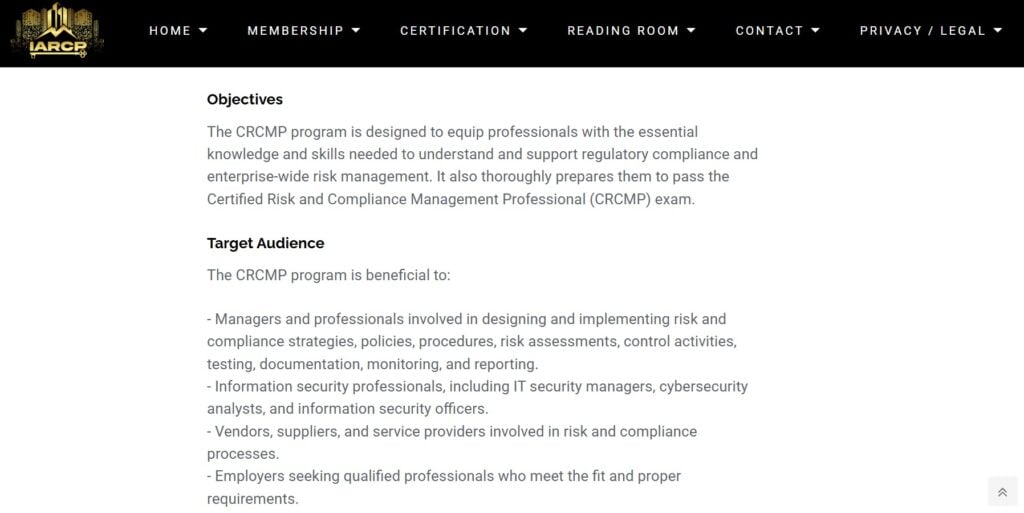
The Certified Risk and Compliance Management Professional (CRCMP) certification validates knowledge in integrating risk management and compliance practices. It's widely recognized globally and emphasizes a strong understanding of regulatory and compliance frameworks, which are essential for managing organizational risks effectively.
Issued by: International Association of Risk and Compliance Professionals (IARCP)
Focus:
- Regulatory frameworks (e.g., Sarbanes-Oxley Act, Basel II and III)
- Governance and risk management
- Compliance management
- Global compliance standards (E-SOX, J-SOX)
- Role of regulatory bodies (SEC, PCOB)
Prerequisites:
- Education: Not required
- Work Experience: Not required
- Exam: Passing the CRCMP exam
- Other Certifications Required: None
Renewability: No, it does not expire
Price: $297
Who It’s For: Compliance officers, risk managers, internal auditors, external auditors, and regulatory affairs specialists
8. Certification in Risk Management Assurance (CRMA) — Best for risk management assurance proficiency
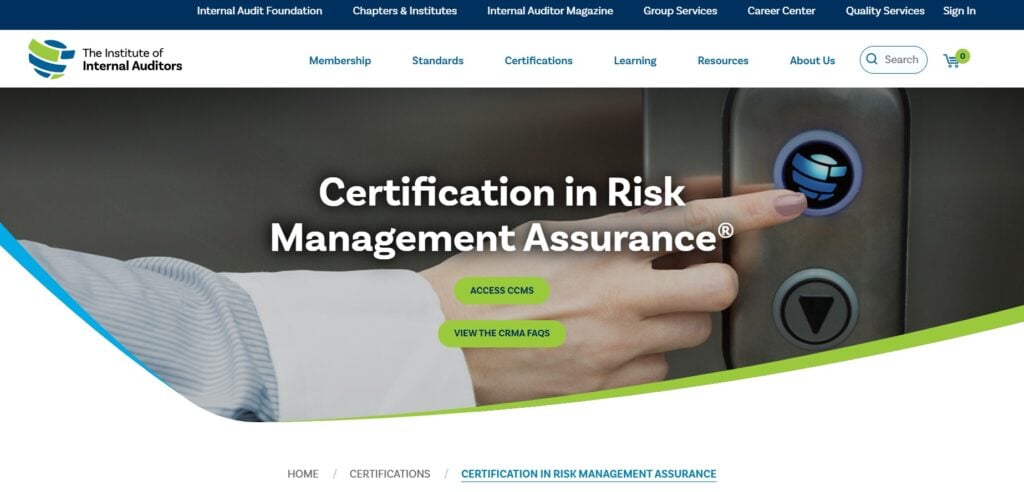
The Certification in Risk Management Assurance (CRMA) certification is a specialized credential for internal auditors focused on delivering risk management assurance. It demonstrates advanced skills in assessing and advising on governance and risk practices within organizations. Overall, this certification enhances the learning experience, strengthens the skill set, and integrates project management principles to support executive-level decision-making.
Issued by: The Institute of Internal Auditors (IIA)
Focus:
- Providing assurance on business processes
- Educating management on risk concepts
- Conducting quality assurance assessments
- Focusing on strategic organizational risks
- Improving governance and control processes
Prerequisites:
- Education: High school diploma, associate degree, GCE, A-Level, or their equivalent
- Work Experience:
- Work in internal audit, quality assurance, risk management, compliance, external audit, or internal control industries
- At least 2 of the 5 required years must be within the past 3 years
- Exam: Passing the CRMA exam
- Other Certifications Required: None
Renewability: Yes, CRMA holders must annually confirm completion of 20 CPE hours
Price:
- Application Fee:
- Member: $100
- Non-Member: $220
- Exam Fee:
- Member: $465
- Non-Member: $610
Who It’s For: Internal auditors, risk managers, compliance officers, and financial analysts
9. Certified Financial Risk Professional (CFRP) — Best for financial risk expertise
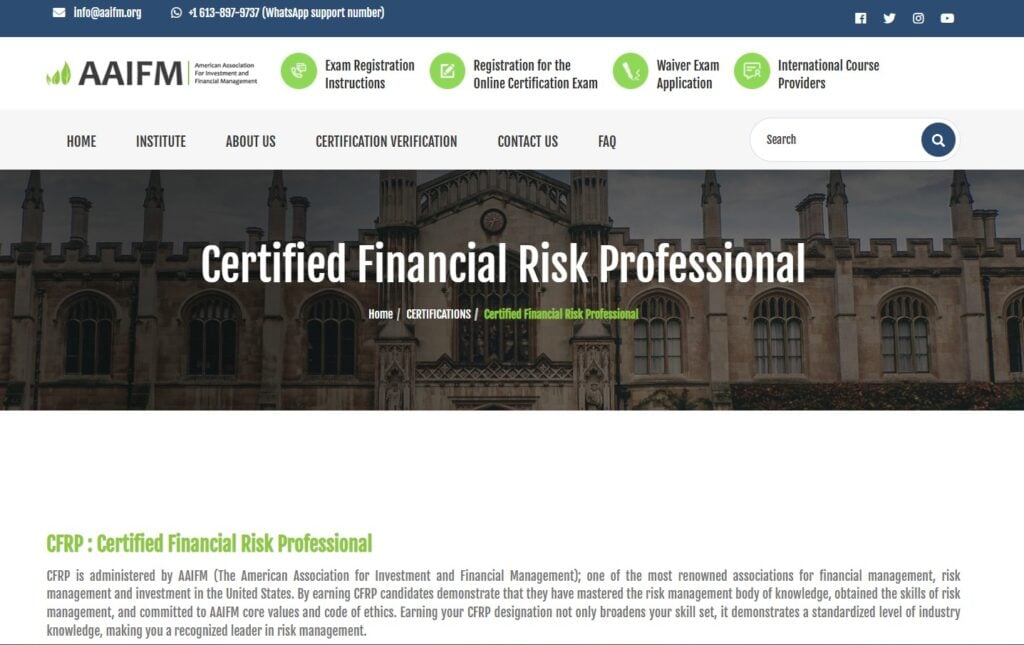
The Certified Financial Risk Professional (CFRP) certification, administered by AAIFM, validates expertise in managing financial risks across various domains. It demonstrates mastery of risk management principles, adherence to ethical standards, and a commitment to professional excellence. Achieving the CFRP designation highlights a standardized level of industry knowledge and a strong foundation in financial risk practices.
Issued by: American Association for Investment and Financial Management (AAIFM)
Focus:
- Quantitative analysis
- Market risk management
- Regulation
Prerequisites:
- Education: Bachelor's degree in any field
- Work Experience:
- 2 years in a related risk area (e.g., risk management, actuary, finance, accounting, investment)
- 25 hours of approved risk management training
- Exam: Passing the CFRP exam
- Other Certifications Required: None
Renewability: Yes, every four years
Who It’s For: Financial analysts, risk managers, credit analysts, investment bankers, corporate finance professionals, auditors, actuaries, consultants in risk management
10. International Certificate in Financial Services Risk Management — Best for financial services risk specialization
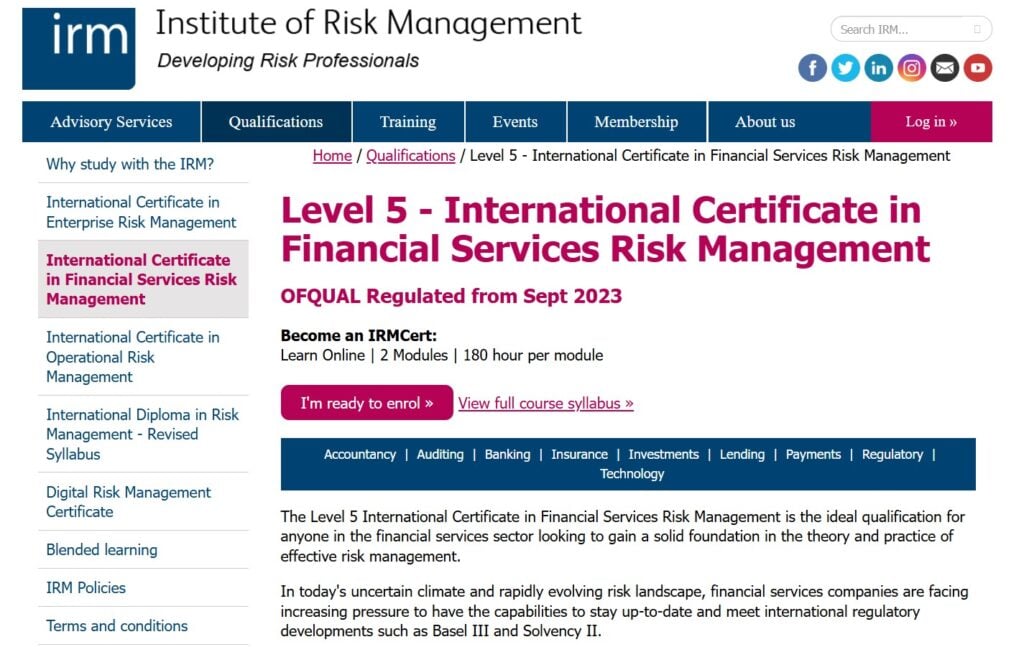
The International Certificate in Financial Services Risk Management provides a structured understanding of risk management in the financial services sector. It addresses the challenges of evolving risks and regulations, equipping candidates with the ability to manage and mitigate financial and operational risks effectively. Overall, this globally recognized certification emphasizes the integration of risk management within governance and resilience frameworks.
Issued by: Institute of Risk Management (IRM)
Focus:
- Principles of risk and risk management
- Financial services risk management
- Regulatory standards
- Financial and operational risks
- Sustainability in financial services
Prerequisites:
- Education: Not required
- Work Experience: Not required
- Exam: Passing the IRM exams
- Other Certifications Required: None
Renewability: No, it does not expire
Price:
- Standard Rate: $3,105
- Member Rate: $2,637
- Low GDP Rate: $2,305
Who It’s For: Financial services professionals like financial analysts, risk managers, compliance officers, auditors, investment bankers, corporate finance professionals, treasury managers
11. Certificate in Financial and Credit Risk Management — Best for credit and financial risk management
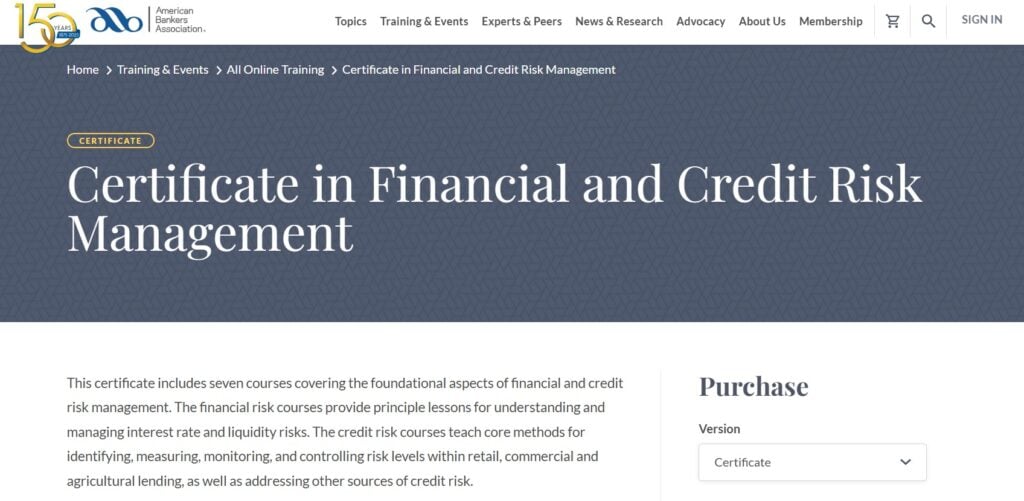
The Certificate in Financial and Credit Risk Management provides comprehensive training on managing financial and credit risks in various lending and financial scenarios. It focuses on identifying, measuring, and controlling risks while ensuring sound risk practices across financial operations. The program offers a structured curriculum to develop a solid foundation in risk management techniques.
Issued by: American Bankers Association
Focus:
- Interest rate risk
- Liquidity risk
- Credit risk management techniques for various lending types
Prerequisites:
- Education: Completion of specified courses
- Work Experience: Not required
- Exam: Not required
- Other Certifications Required: None
Price:
- ABA members: $1,295
- Non-members: $1,795
Who It’s For: Banking professionals like financial analysts, risk managers, credit analysts, investment bankers, corporate finance professionals, auditors, loan officers, treasury managers, compliance officers, portfolio managers, and more
12. Certified Financial Risk Management Professional (CFRMP) — Best for business-focused financial risk management
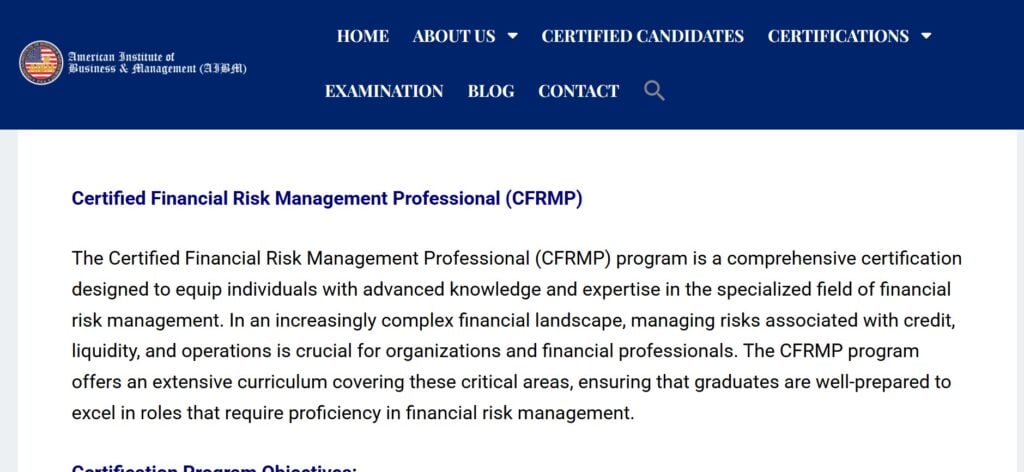
The Certified Financial Risk Management Professional (CFRMP) certification provides specialized training in managing financial risks across credit, liquidity, and operational domains. It focuses on enhancing knowledge of risk analysis, governance, and advanced strategies for mitigating financial instability. This program prepares participants to address complex financial risks and maintain organizational resilience effectively.
Issued by: American Institute of Business Management
Focus:
- Credit risk management
- Liquidity risk management
- Operational risk management
- Risk analysis and mitigation strategies
- Risk governance and compliance
Prerequisites:
- Education: Bachelor's degree
- Work Experience: 2 to 5 years of relevant experience
- Exam: Passing the AIBM exam
- Other Certifications Required: None
Renewability: No, it does not expire
Price:
- Certification Fee: $1,330
- Examination Exemption Fee: $100
Who It’s For: Risk managers, financial analysts, compliance officers, investment managers, and finance professionals
FAQs About Financial Risk Management Certifications
What is a Financial Risk Manager (FRM) certification?
The Financial Risk Manager (FRM) certification is a globally recognized professional designation offered by the Global Association of Risk Professionals (GARP). It is designed for individuals who want to demonstrate their expertise in managing financial risk and is often pursued by professionals in banking, asset management, and other financial services sectors.
How do I become FRM certified?
To become FRM certified, candidates must pass two exams: FRM Part I and FRM Part II. Additionally, candidates need to have at least two years of relevant work experience in financial risk management or a related field. The certification process also requires continuous education to maintain the designation.
What are the benefits of obtaining an FRM certification?
Obtaining an FRM certification can enhance your career prospects, as it is valued by employers in the finance industry for its rigorous focus on risk management. It demonstrates a deep understanding of risk analysis, control, and market practices, potentially leading to better job opportunities and higher earning potential.
How long does it take to prepare for the FRM exams?
Preparation time for the FRM exams varies depending on the candidate's background and experience. On average, candidates spend about 200-300 hours studying for each part of the exam. It is recommended to start preparation several months in advance to cover all topics comprehensively.
Are there any prerequisites for taking the FRM exam?
There are no formal prerequisites for taking the FRM exam, meaning anyone can register for the exams. However, a strong background in finance, mathematics, or business can be beneficial, as the exams cover complex financial concepts and quantitative analysis.
Other Useful Resources
Looking for more courses or articles similar to financial risk? Here are a few other useful programs and pieces to check out:
What’s Next?
Ready to compound your abilities as a finance professional? Subscribe to our free newsletter.

